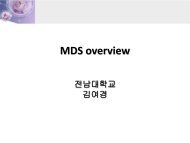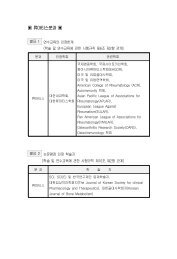Clinical
Clinical
Clinical
You also want an ePaper? Increase the reach of your titles
YUMPU automatically turns print PDFs into web optimized ePapers that Google loves.
THE ENDOCRINE SOCIETY’S CLINICAL GUIDELINES<br />
(47); testosterone should not be administered to men<br />
with these cancers. Although some have suggested that<br />
patients with low testosterone levels who have been<br />
disease-free 2 or more years after radical prostatectomy<br />
and who have undetectable PSA levels may be<br />
considered for testosterone replacement on an<br />
individualized basis (48, 49), the lack of randomized<br />
trials data precluded a general recommendation.<br />
TABLE 4. Conditions in which testosterone<br />
administration is associated with a high risk of<br />
adverse outcome and in which testosterone<br />
should not be administered<br />
Very high risk of serious adverse outcomes<br />
• Metastatic prostate cancer<br />
• Breast cancer<br />
Moderate to high risk of adverse outcomes<br />
• Undiagnosed prostate nodule or induration<br />
• Unexplained PSA elevation<br />
• Erythrocytosis (hematocrit > 50%)<br />
• Severe lower urinary tract symptoms associated<br />
with benign prostatic hypertrophy as indicated by<br />
AUA/IPSS > 19<br />
• Unstable severe congestive heart failure (class III or IV)<br />
A prostate nodule or induration or an elevated PSA<br />
may indicate previously unrecognized prostate cancer.<br />
Furthermore, in men with erythrocytosis, untreated<br />
obstructive sleep apnea, severe lower urinary tract<br />
symptoms, or severe congestive heart failure,<br />
testosterone may worsen these conditions (5, 50).<br />
Open-label studies in young, hypogonadal men have<br />
found a low frequency of adverse events with replacement<br />
doses of testosterone (50). Common drug-related adverse<br />
events include increase in hematocrit, acne, oiliness of<br />
skin, and breast tenderness (Table 5). The frequency of<br />
breast enlargement, sleep apnea, and prostate events is<br />
low in trials of young, hypogonadal men.<br />
TABLE 5. Potential adverse effects of<br />
testosterone replacement<br />
A. Adverse events for which there is evidence of<br />
association with testosterone administration<br />
• Erythrocytosis<br />
• Acne and oily skin<br />
• Detection of subclinical prostate cancer<br />
• Growth of metastatic prostate cancer<br />
• Reduced sperm production and fertility<br />
B. Uncommon adverse events for which there is weak<br />
evidence of association with testosterone<br />
administration<br />
• Gynecomastia<br />
• Male pattern balding (familial)<br />
• Worsening of BPH symptoms<br />
• Growth of breast cancer<br />
• Induction or worsening of obstructive sleep apnea<br />
C. Formulation-specific adverse effects<br />
• Oral tablets<br />
– Effects on liver and cholesterol<br />
(methyltestosterone)<br />
• Pellet implants<br />
– Infection, expulsion of pellet<br />
• Intramuscular injections of testosterone enanthate or<br />
cypionate<br />
– Fluctuation in mood or libido<br />
– Pain at injection site<br />
– Excessive erythrocytosis (especially in older<br />
patients)<br />
• Transdermal patches<br />
– Skin reactions at application site<br />
• Transdermal gel<br />
– Potential risk for testosterone transference to<br />
partner (need to remind patient to cover<br />
application sites with clothing and to wash skin<br />
and hands with soap before having skin-to-skin<br />
contact with another person)<br />
• Buccal testosterone tablets<br />
– Alterations in taste<br />
– Irritation of gums<br />
2.1.2 Placebo-controlled, randomized trials. Our<br />
systematic review found no randomized, placebocontrolled<br />
trials of the effect of testosterone therapy on<br />
10

















